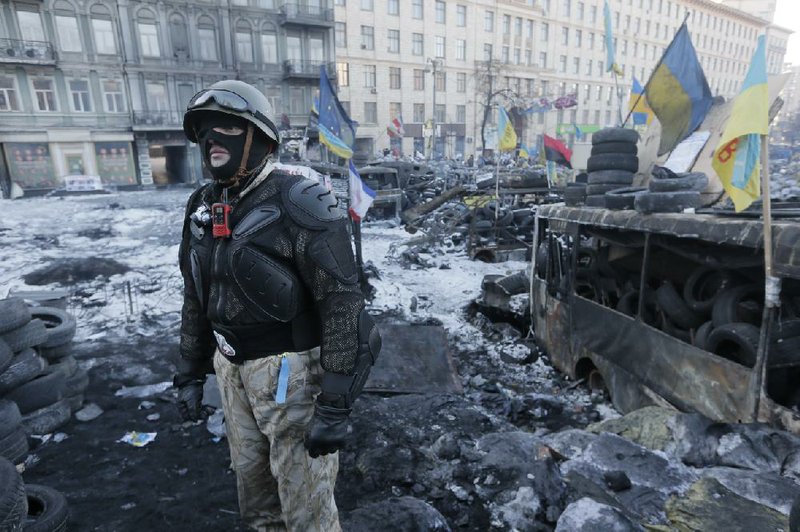KIEV, Ukraine - Ukraine’s president will return today from a short sick leave that had prompted a guessing game as to whether he was taking himself out of action in preparation to step down or for a crackdown on widespread anti-government protests.
Viktor Yanukovych’s office made the announcement about the president’s return the same day that protesters seeking his resignation held one of their largest gatherings in recent weeks.
About 20,000 people assembled at the main protest site in Kiev’s central square on Sunday.
“Yanukovych is feeling well. After necessary treatment the state of his health is satisfactory,” Dr. Oleksandr Orda said in the statement announcing the president’s return.
Yanukovych’s sick leave was announced Thursday, with his office saying he had an acute respiratory illness. Some opposition leaders were skeptical, however, and thought Yanukovych was disappearing from the limelight in preparation for imposing a state of emergency amid the deepest turmoil in Ukraine since the Orange Revolution in 2004-05.
The protests began in late November after Yanukovych backed away from a long-awaited agreement to deepen ties with the European Union. They quickly grew to encompass a wide range of grievances after police violently dispersed some of the early gatherings.
“Repression works in reverse. More people are coming to Maidan,” said demonstrator Tamara Tribko, using the abbreviated name of the square where an extensive tent camp has been established since early December.
Top opposition figures spoke to the rally to urge supporters to push forward with their demands.
Arseniy Yatsenyuk, one of the protest leaders, emphasized the importance of obtaining the release of all people arrested during the protests.
“We must free all,” Yatsenyuk said, adding that there were 116 people being held. “Freedom to every hero.”
Yanukovych’s sick leave was announced the morning after the parliament voted to offer amnesty to many of those arrested during protests on the condition that demonstrators vacate some of the buildings they occupy in Kiev and elsewhere in the country.
The measure was greeted with disdain by protesters, who characterized it as the government essentially taking hostages and then using them to try to negotiate concessions. Kiev’s City Hall, which protesters have seized,is being used as an operations center and dormitory key to supporting the extensive protester tent camp on the nearby Independence Square.
Demonstrators put up memorial stands with pictures of the missing and killed while volunteers were handing out tea and food. Piles of secondhand winter clothes and blankets are available near the opposition’s headquarters, a seized trade-union building guarded by men carrying steel pipes and sledgehammers.
Another protest leader, former heavyweight boxing champion Vitali Klitschko, said that opposition hopes for cooperation from abroad are high.
“The crisis will end at last when under the auspices of the international community we will hold new elections that will stop the regime of Yanukovych,” he said.
Klitschko asked Ukrainians to picket their regional government buildings today in a show of force across the eastern European nation.
On Tuesday, parliament is expected to consider changes to the constitution that would reduce some presidential powers and allot them to the prime minister. Yanukovych last week accepted the resignation of Prime Minister Mykola Azarov, but he hasn’t appointed a replacement.
Also Sunday, authorities granted permission to a prominent opposition activist to leave Ukraine for treatment of injuries he sustained after purportedly being kidnapped and tortured.
Dmytro Bulatov disappeared on Jan. 22 and resurfaced a week later, heavily bruised and with part of an ear cut off. The drubbing, along with the beatings of other activists, one of whom died, raised fears that government supporters are using brutal hirelings to intimidate the opposition.
Police had sought Bulatov for questioning on suspicion of organizing mass disorder, but prosecutors said he was free to go Sunday.
He was taken to an airport and Klitschko said he would be flown to Latvia for treatment.
The opposition is gathering evidence of human-rights violations, including “torture and abductions” of demonstrators, for international tribunals, Svoboda leader Oleh Tyahnybok said.
Information for this article was contributed by Jim Heintz and Yuras Karmanau of The Associated Press and by Daryna Krasnolutska, Kateryna Choursina and Olga Tanas of Bloomberg News.
Front Section, Pages 4 on 02/03/2014

